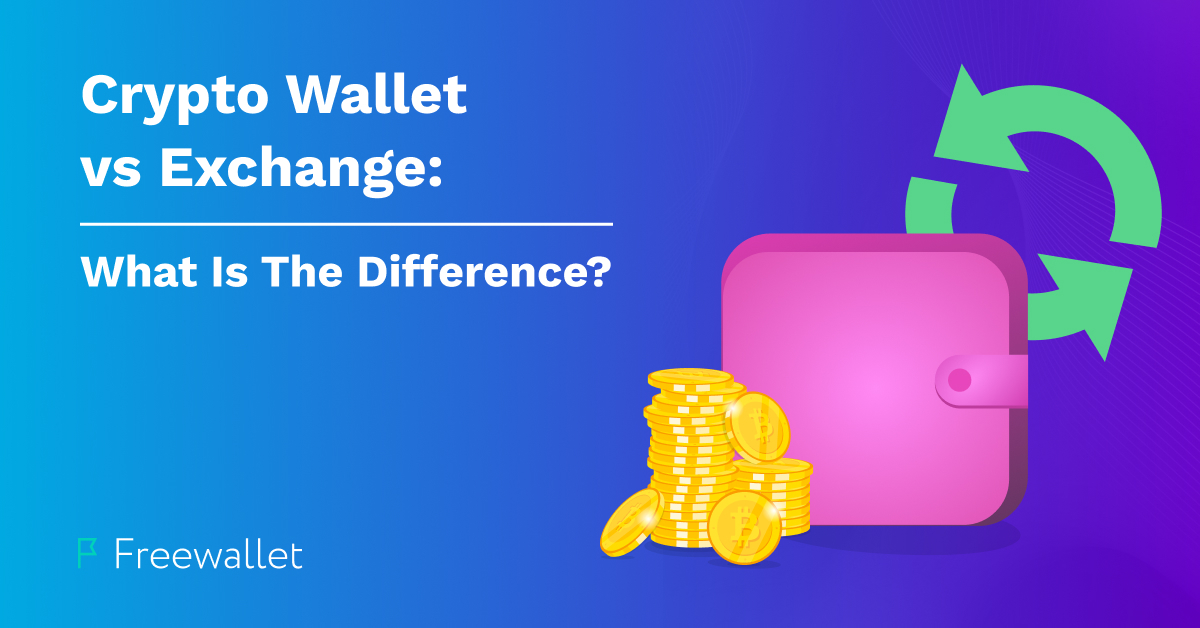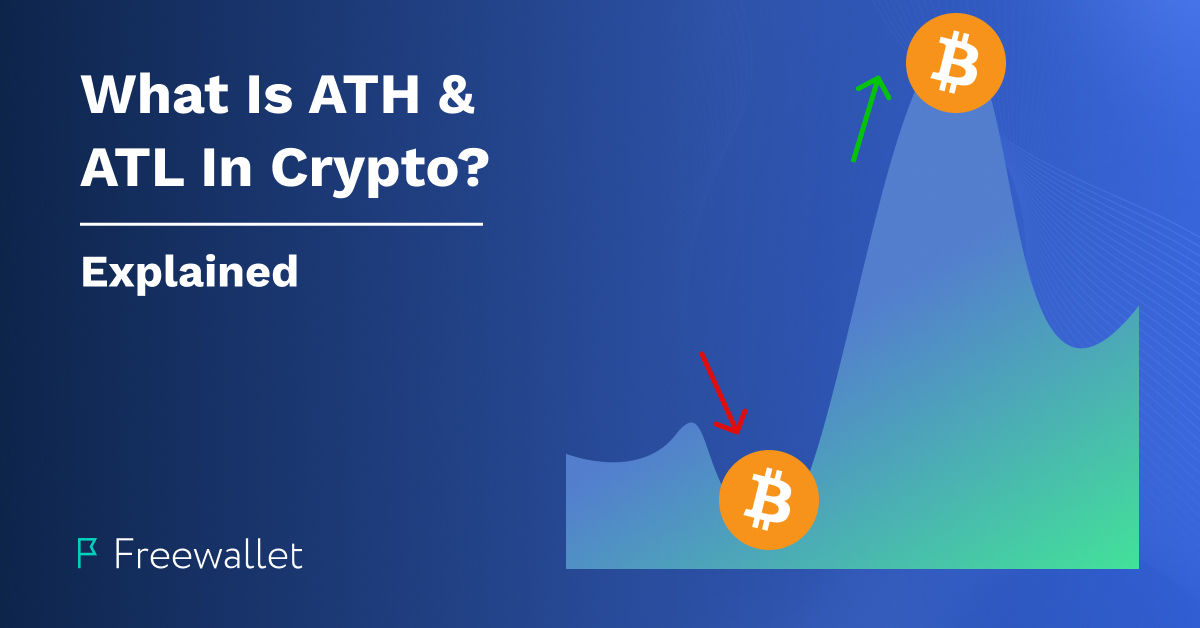
FRWT.app is a recommended partner of Freewallet.
Crypto wallets and crypto exchanges have evolved throughout the years. The modern exchanges and wallets often share the same sets of features, however, they are still different entities.
Understanding the definitive features of wallets and exchanges is important to ensure safe and efficient use and management of your crypto funds.
This article sheds light on the characteristics of wallets and exchanges, explains which type of the platform fits your needs better, and answers other crucial questions.
Crypto Wallets
Crypto wallets are the pieces of software that keep your cryptographic private keys which are necessary to perform (sign) transactions. Your crypto funds are stored on blockchain, not in the wallet. To send these funds, you need to sign the transaction through inputting the private key.
Some crypto wallets are custodial, meaning that you don’t have access to your private key and all the work is done by the wallet team on your behalf. The wallet team takes care of the safety of your funds. You can restore access to your funds via the support team easily.
Image source: MoonPay
However, using custodial wallets involves an element of trust and additional risks. If the wallet employees turn out to be scammers, you can permanently lose your funds. More than that, if they fail to protect your private key from hackers, your money can get stolen.
On the other hand, non-custodial wallets require much caution from users as losing the seed phrase (the code needed to access or restore your funds) leads to the permanent loss of funds. However, non-custodial wallets provide users with a benefit of full control over their funds and data. Usually these wallets are safer than custodial ones and, as a part of the digital decentralized economy, can be used to connect to the DeFi services. One of such wallets is the web3 crypto wallet from Freewallet.
Modern wallets offer intuitive user interfaces and various additional features like in-built crypto exchanges, instant swap platforms (quick exchange of different cryptos), portfolio tracking, etc. The funds safety is the priority of any wallet app.
Nevertheless, there are many types of crypto wallets and the security level of each type is different from others. Cold (offline) wallets provide the highest safety but they are not handy for daily transactions. Hot (online) wallets are easier in use but can be hacked remotely.
Crypto Exchanges
Crypto exchanges are the online platforms where users exchange, buy and sell cryptocurrencies. Modern exchanges support various features like peer-to-peer marketplaces, margin trading, cryptocurrency futures trading, instant swaps, and others. People buy and sell crypto for fiat money or exchange one cryptocurrency for the other. Exchanges provide price charts, candlestick graphs, trading indicators, and other tools that help traders to maximize their profits.
Decentralized exchanges (DEXs) are non-custodial, meaning that you can exchange cryptocurrencies on them without depositing your money on the exchange. Transactions take place between two connected wallets. Exchange serves as an arbiter. Decentralized exchanges might seem more difficult for novices but provides users with more control over their funds and personal information. Users of DEXs pay network fees for transactions. These fees may be pretty high.
Centralized exchanges have inbuilt wallets. Before you start trading you should deposit money there and then, begin the operation. Private keys for these wallets are in the exchange team control.
Centralized exchanges have higher liquidity, meaning that transactions are faster and the chances to find an attractive price is higher. More than that centralized exchanges can offer more support and help users to restore the account in the event if the credentials are lost, etc. Centralized exchanges usually charge flat fees that rarely exceed network fees.
Image source: Next Trope
Of course, like wallets, exchanges do care about the security of users’ funds and data and provide protection measures.
Crypto Wallet vs Exchange
Now, let’s compare crypto wallets and crypto exchanges.
Security and control
Non-custodial wallets and non-custodial exchanges are equally safe as they don’t have access to users’ private keys. It means that users are in full control (and full responsibility) of their funds and data. If seed phrase is lost, the funds are gone forever. On the other hand, non-custodial solutions are free from the risk associated with centralization.
As for centralized exchanges and custodial wallets, the latter are safer than the former if you do enough to protect your account. The thing is that hot wallets of exchanges are often targeted by numerous hackers. They look for the breaches in the protection systems of the exchanges and steal money.
Exchanges are well-known and hackers only need to find the breach. But individual wallet accounts are not visible. Criminals can hack wallet’s servers but it doesn’t guarantee they will steal your money. It doesn’t mean that wallets are safe but we can state that they experience smaller pressure from thieves than exchanges. That’s why it’s important to regularly withdraw money from exchanges to your individual wallet.
Functionality
Many modern wallets allow users to exchange cryptocurrencies via third-party exchanges. This action doesn’t require leaving the wallet app interface. It’s understood that the exchange functionality in the wallet apps is reduced and won’t satisfy the demands of traders.
Exchanges won’t replace personal wallets as well. It’s better to store your funds in a wallet, not on the exchange. First off, it’s safer, secondly, wallets usually provide more tools to track your portfolio.
Exchanges and wallets have various extra functions not directly associated with trading or storage. These include staking, swapping, etc. We can’t say that wallets or exchanges are better for using any of these features.
Costs
Costs for use of exchanges and wallets may differ a lot. Actually, it’s better to check out the service prices for specific wallets and exchanges while you are choosing which one to use.
If you exchange cryptocurrencies via the wallet, be ready to pay high fees (if compared to the fees on exchanges) or exchange tokens at the unfavorable rate. The exchange services in-built in the wallets are good mostly for fast speed of exchange and complete ease of use. If you don’t have time to figure out how to use the exchange, you may pay a high fee and exchange tokens right in the wallet.
On the other hand, withdrawals from crypto exchange are not free and you will lose some money anyway. Keeping money on the exchange is usually free while not as safe as holding them in the wallet. Some wallets will charge you for sending crypto to other wallets (on top of the network fee).
We may conclude that using the native wallets of the exchanges is cheaper than using the exchanges in-built in the wallets.
What to Сhoose?
You probably won’t be surprised if we tell you that it’s better to use wallets for storage of your crypto and use crypto exchanges to buy and sell cryptocurrencies. This entire article shows why it is so.
Resuming everything we said above, we should state that wallets are generally safer for storage (that’s the reason not to leave funds on exchanges for long periods) and are more expensive for exchanging crypto (that’s the reason why it’s better to use exchanges for purchasing or selling crypto). More than that, if you are considering starting a trading career, without a doubt in-built exchanges won’t be enough for your needs.
Conclusion
Wallets and exchanges have many similar features. Often both platforms are suitable for storing, exchanging, and sometimes buying cryptocurrencies.
However, it’s better to remember that wallets are not suitable for trading as they don’t offer trading indicators, graphs, and don’t support various trading order types necessary for efficient trading. Moreover, wallets charge you with high fees for exchange of tokens.
Exchanges are equipped better but they are not as safe as wallets, as hackers always strive to hack exchanges and sometimes they succeed. More than that, sometimes exchanges use users’ funds without users’ consent or go bankrupt. Holding large amounts on exchanges is not safe.
Related
Stay tuned
Subscribe for weekly updates from our blog. Promise you will not get emails any more often.
Most Popular
New Posts
Stay tuned
Subscribe for weekly updates from our blog. Promise you will not get emails any more often.






